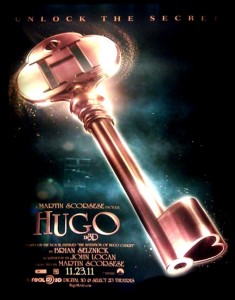 Hugo Cabret is a young porcelain faced boy with luminous blue eyes. He lives in the clocktower in a train station and spends most of his days scurrying though recesses and behind walls ensuring the numerous timepieces in the station run like… well you know.
Hugo Cabret is a young porcelain faced boy with luminous blue eyes. He lives in the clocktower in a train station and spends most of his days scurrying though recesses and behind walls ensuring the numerous timepieces in the station run like… well you know.
Hugo avoids attention at all costs and rarely ventures out into the station among the hubbub of the faceless throngs wending their way to and from places unknown, except on rare occasions to find food and parts that he needs, ever watchful for the vindictive and over zealous Station Inspector (Sacha Baron Cohen) who has a nasty habit of handing orphans over to the authorities at a moment’s notice.
But both hunger and necessity force Hugo from the safety afforded behind the main walls, for the young lad is working on a project that holds great significance for him, something that requires parts that aren’t available without risk.
It is on one of these excursions that Hugo finds himself face to face with a highly disgruntled merchant who runs a toy stall. The merchant is Georges (Ben Kingsley), and he confiscates Hugo’s beloved and treasured notebook as punishment.
Hugo teams with the merchant’s ward Isobel (Chloe Moretz), who senses an adventure brewing and the two uncover facts that involve both Hugo’s and Georges’ pasts.
I went into Hugo positive I would be wowed, and in a way I was, but before I go dubbing flicks Great or handing out Oscars there is one thing I would like answered…
Hugo is a visual feast for the eyes, boasts a charm level off the charts and production values that should make the mediocre directors of this world sob. But what is it about?
Of course having seen it I could throw 500 more words at you running through the events and characters of the film. That’s not what I am asking, anyone with a pair of 3D glasses, two hours and twenty bucks could tell you that. I am curious as to what Martin Scorcese was trying to say, and I can’t do justice to my curiosities here without massive spoilers, so I won’t.
Instead I will say that Hugo is a supreme work of brilliant visuals and lush production that taught me precious little. If you asked me what the message was or the feeling I was supposed to take away as a viewer I could not answer. There are numerous themes and plot developments hinted at that either peter out to nothing or aren’t taken to their logical conclusion, and one character has an about face so sudden and inexplicable that it made my head spin.
For mine Hugo is a brilliantly realised exercise in confusion, a frustrating story so expertly presented that most chose to ignore the fact that at its core Hugo isn’t really about anything aside from universal happy endings.
It is like a dopey cheerleader giving a speech, it rambles on a little bit and doesn’t have a point but shucks it all sure is purty.
Does any of this make Hugo a worthless film? No chance, it is charming and obviously a work to be appreciated, the sheer level of attention to detail, along with technical excellence and expert acting are admirable.
I have wracked my brains over what the central theme may be with this film, and come up with a great many possibilities. Without describing any of them what I will say is that I don’t think there is one overriding message here, and if there was it wasn’t well realised.
So while Hugo might be a breathtaking work of superlative cinema visuals, it is only a very good film, not a truly great one.
Final Rating – 7.5 / 10. A fine family friendly charmer of a film (a bit slow and deliberate for the wee littlies) and a visual masterpiece.
Spoilers ahead…
Spoilers
Spoilers!!
Ask yourself the following questions:
- What was the significance of Christopher Lee’s character aside from being dignified and telling you books are nice?
- Why was Hugo to work with Georges in his store but never did – aside from fixing the mouse.
- Wasn’t it just a little twee that the author of the book the kids are reading rocks up over their shoulder?
- What logic is there for Georges to quit filmmaking and hate it so much because of war? I think film would have represented a welcome escape from the horrible reality of wartime atrocity.
- And explain to me why after arguing with his wife, berating his daughter and resenting Hugo does a three minute screening of his flick cause an about face?
I would love to say that in fixing the automaton and ‘curing’ Georges hatred of film that Hugo re-connects with a Father figure and finds the love of a new family. I don’t think that was relayed at all effectively in the film. Instead we get a hackneyed message that ‘films are great’ shoehorned in.
If someone can clear this up for me in a tweet length summation I will be forever grateful. Until then I will justify the fawning over Hugo as a career achievement award for Martin Scorcese and not as a genuine reaction to what I think is only a decent film.
